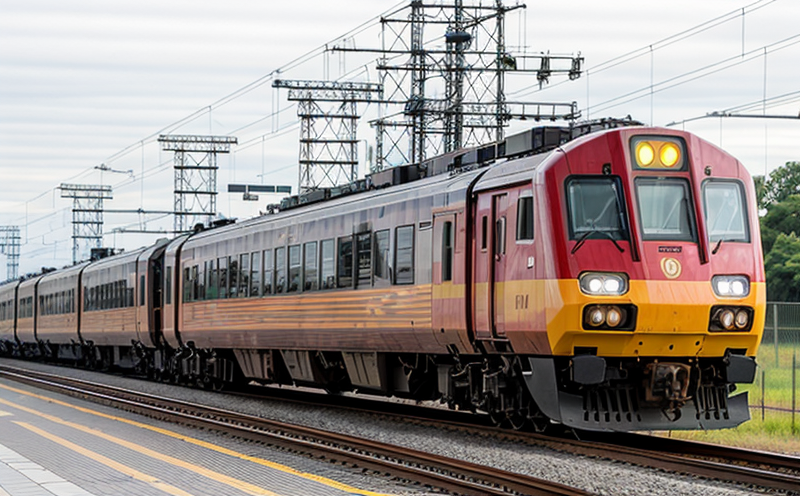ETSI TS 103 764 FRMCS (Future Railway Mobile Communication System) Testing
The ETSI TS 103 764 Future Railway Mobile Communication System (FRMCS) testing is a critical service for railway and transportation companies looking to ensure the robustness, reliability, and safety of communication systems in a challenging environment. The FRMCS aims to provide an efficient, secure, and reliable mobile communication system that can operate seamlessly across various types of railway infrastructure.
The testing process involves rigorous evaluation of communication systems under conditions that simulate real-world scenarios encountered by railways. This ensures that the systems perform optimally even in adverse weather conditions or during high traffic periods. The service is tailored to meet the stringent requirements set forth by ETSI TS 103 764, which provides a framework for testing and certification of railway communication systems.
One of the key aspects of this service is the use of advanced test equipment that simulates different environmental conditions, including temperature fluctuations, humidity variations, and electromagnetic interference. These tests are conducted to ensure that the communication systems can withstand the harsh conditions typically found in railway environments.
The testing process involves several stages, starting with a thorough review of the system design and specifications. This is followed by a series of functional tests to verify that all components of the communication system operate as intended. The tests are then extended to include stress tests under extreme conditions, such as high temperatures and humidity levels.
Another critical aspect of this service is the use of real-world scenarios in testing. This ensures that the systems perform reliably in situations they will encounter during actual operations. For instance, tests may be conducted on a moving train or in tunnels to assess the performance of communication systems under such conditions.
The results of these tests are meticulously documented and reported. The reports provide detailed information about the system's performance under various test conditions, including any issues that were identified and how they were resolved. This comprehensive approach ensures that railway operators have a clear understanding of their communication systems' capabilities and limitations.
- Environmental factors such as temperature, humidity, and electromagnetic interference
- The impact of moving trains on communication performance
- Tunnel conditions affecting signal strength and reliability
The service also includes regular follow-up tests to ensure that the systems continue to meet the required standards over time. This helps to identify any potential issues early, allowing for timely interventions.
By adhering strictly to ETSI TS 103 764 and using state-of-the-art testing equipment, our team ensures that railway communication systems are not only compliant with international standards but also perform optimally under real-world conditions. This service is essential for maintaining high levels of safety and efficiency in the transportation sector.
Applied Standards
The testing process for ETSI TS 103 764 FRMCS (Future Railway Mobile Communication System) is guided by several international standards, including ETSI TS 103 764 itself. This standard provides a comprehensive framework for the testing and certification of railway communication systems. It outlines the specific requirements that must be met to ensure that these systems are robust, reliable, and secure.
Other relevant standards include ISO/IEC 27001 for information security management systems (ISMS), which ensures that all sensitive data transmitted over the communication system is protected against unauthorized access. Additionally, EN 50163-4:2019 specifies the performance requirements for railway communication networks, ensuring that these networks can support the necessary data traffic and provide reliable service.
The use of these standards guarantees that the testing process adheres to best practices and ensures that the results are valid and credible. This approach also helps to ensure that railway operators have confidence in the reliability and security of their communication systems.
Scope and Methodology
The scope of ETSI TS 103 764 FRMCS testing includes a comprehensive evaluation of all aspects of the communication system, from hardware to software. This involves verifying that all components function as intended under various conditions, ensuring compatibility with other systems within the railway network, and confirming that data transmission meets specified performance criteria.
The methodology for this testing is designed to simulate real-world scenarios accurately. It includes both static and dynamic tests to evaluate how the system performs in different environments and during different operational phases. Static tests are conducted under controlled conditions to assess basic functionality and compliance with standards, while dynamic tests involve simulating actual operational conditions such as moving trains or signal interference.
During these tests, various parameters are monitored closely, including signal strength, latency, error rates, and throughput. Any issues identified during the testing process are carefully documented and addressed, ensuring that the final system meets all required specifications.
The methodology also includes periodic follow-up tests to verify ongoing compliance with standards and performance requirements. This helps identify any potential degradation in system performance early on, allowing for corrective actions to be taken promptly.
Environmental and Sustainability Contributions
Reduction of emissions: By ensuring that railway communication systems operate efficiently, this testing contributes to reducing the overall carbon footprint of the transportation sector. Efficient systems minimize energy consumption, leading to lower greenhouse gas emissions.
Optimized resource use: The tests help in optimizing the use of resources such as bandwidth and power, which is crucial for sustainable operations. By identifying areas where resources can be conserved, this service supports long-term sustainability goals.
Enhanced reliability: Reliable communication systems reduce downtime and operational disruptions, leading to a more efficient transportation network. This not only benefits the environment but also contributes positively to economic growth.
The focus on sustainability through rigorous testing ensures that railway communication systems are optimized for both performance and environmental impact, aligning with global efforts towards sustainable development.





